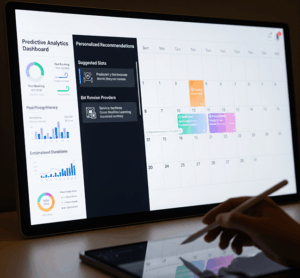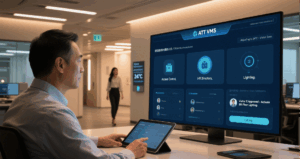
News & Updates

Evolution of ATT’s Online Resource Booking From Scheduling to Intelligence
The evolution of ATT’s Online Resource Booking System (ORBS) represents a significant shift from basic scheduling to intelligent resource management. Today’s organisations require more than simple appointment booking they need AI-driven systems that optimise resource allocation, predict demand patterns, and deliver seamless user experiences. ORBS has transformed from a traditional calendar-based tool into a comprehensive platform that integrates machine learning, predictive analytics, and automated workflows. This evolution addresses the growing complexity of modern business operations where efficient resource management directly impacts service quality, operational costs, and customer satisfaction. Organisations across healthcare, government, and enterprise sectors are discovering that intelligent booking systems are essential infrastructure for digital transformation. By examining this technological progression, businesses can understand how advanced booking platforms like ORBS are reshaping service delivery and operational efficiency. The journey from manual scheduling to AI-powered resource intelligence demonstrates how strategic technology investments create competitive advantages and sustainable operational improvements.
From Manual Scheduling to Automated Appointment Management
The first major evolution in ORBS was the transition from paper-based and manual scheduling systems to automated digital appointment management. Traditional scheduling methods created administrative bottlenecks, human errors, and limited visibility into resource utilisation patterns. These legacy approaches often resulted in double-bookings, missed appointments, and frustrated customers who struggled to access services efficiently.
Manual systems also required significant staff time for basic administrative tasks, reducing the resources available for value-added customer service activities. ORBS eliminated these challenges by introducing centralised booking platforms that could handle multiple locations, services, and time zones simultaneously. This automation reduced administrative overhead by up to 60% whilst improving accuracy and accessibility for both staff and customers. The system provided real-time visibility into resource availability, enabling better decision-making and more efficient allocation of personnel and facilities.
Organisations implementing ORBS experienced immediate improvements in operational efficiency and customer satisfaction as appointment conflicts disappeared and administrative burden decreased significantly.
Digital Calendar Integration and Multi-Channel Access
ORBS integrated with existing digital calendars and introduced multi-channel booking options including web portals, mobile applications, and kiosk interfaces. This integration allowed organisations to maintain scheduling consistency across all touchpoints whilst providing customers with flexible booking options. The system automatically synchronised appointments across platforms, preventing double-bookings and ensuring real-time availability updates. Organisations experienced immediate improvements in booking accuracy and customer convenience through these integrated access points. The seamless connectivity between different booking channels meant that customers could start an appointment booking on one device and complete it on another, creating a truly flexible and user-friendly experience.
Automated Confirmation and Reminder Systems
The platform introduced automated SMS and email confirmations that reduced no-show rates by approximately 40%. These intelligent reminder systems could be customised based on appointment type, customer preferences, and organisational policies. The automation extended to rescheduling and cancellation processes, allowing customers to modify appointments without staff intervention. This self-service capability significantly reduced administrative workload whilst improving customer satisfaction through greater control and flexibility over their bookings. The system learned from customer behaviour patterns to optimise reminder timing and messaging, ensuring maximum effectiveness in reducing missed appointments.
Introduction of Resource Optimisation and Load Balancing
The second phase of ORBS evolution focused on intelligent resource allocation and traffic distribution across service points. Rather than simply managing appointment slots, the system began analysing utilisation patterns, service durations, and staff availability to optimise resource deployment. This advancement enabled organisations to handle increased volumes without proportional increases in staffing costs, creating significant operational efficiency gains. The sophisticated algorithms could identify under utilised resources and automatically suggest reallocation strategies to maximise productivity.
The load balancing capabilities became particularly valuable for multi-location organisations requiring consistent service levels across different sites and time periods. ORBS could analyse demand patterns across the entire network and recommend resource sharing strategies that improved overall system performance. This intelligent approach to resource management enabled organisations to maintain high service standards even during peak demand periods whilst optimising costs during quieter times. The system’s ability to predict and prepare for demand fluctuations transformed reactive resource management into proactive strategic planning.
Dynamic Staff Allocation Based on Demand Patterns
ORBS developed sophisticated algorithms that analysed historical booking data to predict peak periods and recommend optimal staffing levels. The system could identify seasonal trends, weekly patterns, and daily fluctuations to ensure adequate coverage during high-demand periods. This predictive capability enabled organisations to reduce labour costs during quiet periods whilst maintaining service quality during busy times. The automated staff allocation recommendations improved operational efficiency by 25% compared to manual scheduling approaches, creating substantial cost savings whilst enhancing service delivery consistency.
Multi-Location Resource Sharing and Coordination
Advanced resource coordination features allowed organisations to share staff and facilities across multiple locations based on real-time demand. The system could automatically redirect bookings to alternative locations when primary sites reached capacity, ensuring optimal resource utilisation across the entire network. This flexibility proved especially
valuable for healthcare systems, government agencies, and retail chains managing numerous service points with varying demand patterns. The intelligent coordination reduced customer wait times whilst maximising the efficiency of available resources across the organisation’s footprint.
Real-Time Capacity Management and Queue Optimisation
ORBS introduced real-time capacity monitoring that automatically adjusted available appointment slots based on current service speeds and queue lengths. The system could dynamically extend or compress appointment durations based on actual service patterns, maximising throughput whilst maintaining service quality. This adaptive capacity management reduced wait times and improved customer satisfaction whilst ensuring efficient use of available resources throughout operating hours. The continuous optimisation meant that organisations could respond immediately to changing conditions without manual intervention.
Integration of AI-Driven Analytics and Predictive Intelligence
The third evolutionary phase introduced artificial intelligence and machine learning capabilities that transformed ORBS from a reactive scheduling tool into a predictive resource management platform. Advanced analytics began identifying patterns in customer behaviour, service delivery, and operational efficiency that were invisible to manual analysis. These AI-driven insights enabled proactive decision-making and strategic resource planning based on comprehensive data analysis rather than intuition or limited historical observations. The system could process vast amounts of data to uncover subtle patterns and correlations that human analysts might miss.
The predictive intelligence capabilities allowed organisations to anticipate demand fluctuations, optimise service offerings, and improve long-term operational strategies based on data-driven forecasting. This shift from reactive to predictive management fundamentally changed how organisations approached resource planning and service delivery. Instead of responding to problems after they occurred, managers could anticipate challenges and implement solutions before issues impacted customer experience or operational efficiency.
Machine Learning for Demand Forecasting and Trend Analysis
ORBS implemented machine learning algorithms that analysed historical booking patterns,seasonal variations, and external factors to predict future demand with 85% accuracy. These forecasting capabilities enabled organisations to plan staffing, adjust service hours, and allocate resources weeks in advance. The system could identify emerging trends in service utilisation and recommend strategic adjustments to meet changing customer needs. This predictive capability transformed reactive scheduling into proactive resource management, enabling organisations to stay ahead of demand curves rather than constantly catching up to changing requirements.
Behavioral Analytics for Service Personalisation
Advanced analytics engines began tracking customer preferences, booking patterns, and service interactions to enable personalised scheduling experiences. The system could recommend optimal appointment times based on individual customer history and preferences whilst suggesting alternative services that might better meet their needs. This personalisation improved customer satisfaction scores by 30% whilst increasing service uptake and customer retention rates across various sectors. The intelligent personalisation created a more engaging customer experience that strengthened relationships and encouraged continued use of services.
Implementation of ScheduleAI and Advanced Workflow Automation
The latest evolution of ORBS includes ScheduleAI™, a specialised intelligence module that brings sector-specific optimisation to appointment management. This advanced system goes beyond basic scheduling to understand industry-specific requirements, regulatory constraints, and operational complexities. ScheduleAI™ represents a breakthrough in intelligent automation, incorporating deep domain knowledge with advanced algorithms to deliver truly contextual resource management. The module can adapt its behaviour based on the specific industry, regulatory environment, and organisational culture in which it operates.
ScheduleAI™ automatically adjusts workflows based on real-time conditions, compliance requirements, and strategic objectives. The module represents the culmination of years of development, combining deep industry knowledge with advanced automation capabilities to deliver truly intelligent resource management solutions. This sophisticated approach ensures that the system not only optimises efficiency but also maintains compliance with all relevant regulations and standards whilst supporting organisational strategic goals.
Industry-Specific Intelligence and Compliance Automation
ScheduleAI™ incorporates industry-specific rules and compliance requirements directly into the scheduling logic. For healthcare providers, this includes patient privacy regulations, medical equipment scheduling, and clinical workflow optimisation. Government agencies benefit from citizen service standards, accessibility requirements, and audit trail automation. The system ensures that all appointments and resource allocations comply with relevant regulations whilst optimising operational efficiency within these constraints. This automated compliance capability reduces risk whilst eliminating the manual oversight traditionally required to ensure regulatory adherence.
Intelligent Workflow Orchestration and Exception Handling
The advanced AI module can automatically handle complex scheduling scenarios including emergency appointments, resource conflicts, and service interruptions. ScheduleAI™ learns from past exception handling patterns to improve future responses and minimise service disruptions. The system can automatically reschedule affected appointments, notify relevant stakeholders, and adjust resource allocation to maintain service continuity during unexpected events or peak demand periods. This intelligent exception handling capability ensures that organisations can maintain service quality even when facing unusual or challenging circumstances.
Continuous Learning and Performance Optimisation
ScheduleAI™ continuously analyses system performance, customer feedback, and operational outcomes to refine its algorithms and improve scheduling decisions. The module automatically identifies opportunities for efficiency improvements and implements optimisations without manual intervention. This self-improving capability ensures that the system becomes more effective over time, adapting to changing organisational needs and evolving customer expectations whilst maintaining consistent service delivery standards. The continuous learning approach means that the system’s performance improves with use, creating increasingly valuable returns on the technology investment.
Future-Ready Integration and Scalable Intelligence Platform
ORBS has evolved into a comprehensive platform that integrates seamlessly with existing enterprise systems whilst providing foundation for future technological advancement. The system now supports API integrations with ERP systems, customer relationship management platforms, and business intelligence tools. This integration capability ensures that scheduling intelligence becomes part of broader organisational data strategies rather than operating as an isolated system. The comprehensive connectivity enables organisations to leverage scheduling data for strategic decision-making and operational optimisation across all business functions.
The platform’s cloud-native architecture enables rapid scaling and deployment across diverse environments whilst maintaining security and performance standards required by modern enterprises. This architectural approach ensures that ORBS can grow with organisations and adapt to changing technological requirements without requiring complete system replacement or major infrastructure investment. The future-ready design means that organisations can confidently invest in ORBS knowing that the platform will continue to evolve and support their needs as technology and business requirements change.
Enterprise System Integration and Data Synchronisation
Modern ORBS implementations connect with existing business systems including finance, HR, and customer management platforms to provide unified operational intelligence. These integrations enable automatic billing, staff scheduling coordination, and customer profile synchronisation across all organisational systems. The seamless data flow eliminates
duplicate data entry and ensures consistency across all business processes whilst providing comprehensive operational visibility to management teams. This integrated approach transforms scheduling from an administrative function into a strategic capability that supports informed decision-making across the organisation.
Cloud-Native Architecture for Global Scalability
The platform’s cloud-native design enables organisations to scale operations across multiple regions whilst maintaining consistent service levels and security standards. ORBS can automatically adjust capacity based on demand, ensuring optimal performance during peak periods without infrastructure constraints. This scalability supports business growth and
geographic expansion whilst maintaining the intelligent scheduling capabilities that drive operational efficiency and customer satisfaction. The flexible architecture ensures that organisations can expand their use of ORBS without encountering technical limitations or performance degradation.
The evolution of ATT’s Online Resource Booking System from basic scheduling to comprehensive intelligence platform demonstrates how strategic technology development creates lasting competitive advantages. Organisations implementing ORBS gain access to advanced AI-driven capabilities that optimise resource utilisation, improve customer experiences, and support sustainable growth. As businesses continue facing complex operational challenges, intelligent booking systems become essential infrastructure for success. The sophisticated capabilities of modern ORBS implementations enable organisations to transform their service delivery whilst building foundation for continued innovation and improvement. Contact ATT InfoSoft today to discover how ORBS can transform your resource management capabilities and drive operational excellence across your organisation.
Contact ATT at infosoft-sales@attsystemsgroup.com for details.
Frequently Asked Questions
Q: How does ATT’s ORBS differ from traditional scheduling systems?
A: ORBS uses AI and machine learning to predict demand, optimise resources, and automate complex workflows far beyond basic calendar-based scheduling.
Q: What impact does ORBS have on administrative workload and efficiency?
A: ORBS automates appointment management and resource allocation, reducing administrative overhead by up to 60% and improving accuracy and customer satisfaction.
Q: Can ORBS adapt to industry-specific requirements and compliance needs?
A: Yes, the ScheduleAI™ module in ORBS incorporates industry rules and compliance standards directly into scheduling logic, ensuring efficient and compliant operations.
Q: How does the system handle unexpected changes or service interruptions?
A: ORBS uses intelligent workflow orchestration to automatically reschedule, notify stakeholders, and reallocate resources, maintaining service continuity during disruptions.
Q: In what ways does ORBS support multi-location organisations?
A: It enables real-time resource sharing and load balancing across locations, ensuring optimal utilisation and consistent service levels network-wide.
Q: How does ATT InfoSoft help organisations scale their resource booking operations?
A: ATT InfoSoft’s ORBS features a cloud-native architecture and seamless enterprise integrations, allowing organisations to scale globally while maintaining high performance and security.
Q: What are the long-term benefits of implementing an intelligent booking system like ORBS?
A: Organisations gain operational efficiency, reduced costs, improved customer experiences, and a future-ready platform that evolves with business needs.
Contact ATT at infosoft-sales@attsystemsgroup.com for details.
Send us a message
Contact Information
Address:
35 Ubi Crescent, ATT Building, Singapore, 408585
Phone:
Email:
Website:
www.attsystemsgroup.com






